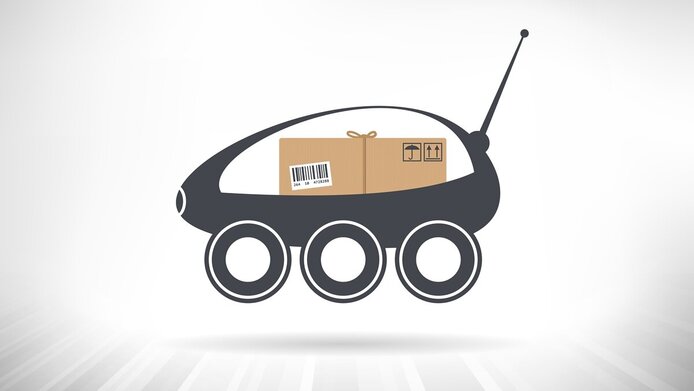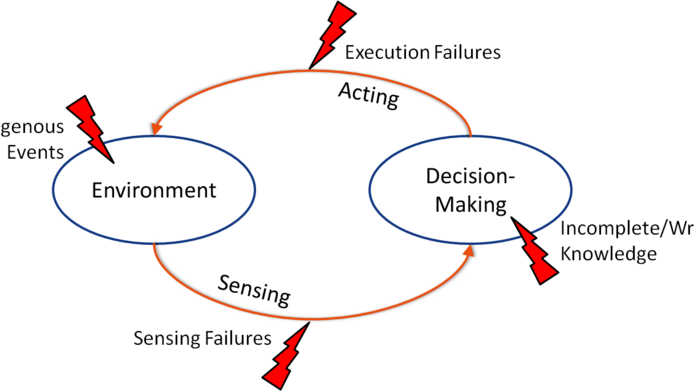Artificial intelligence plus common sense

Something that children learn through play and that adults are able to do on the basis of past experience, such as responding to unexpected situations, remains one of the great challenges in robotics. Autonomous systems are expected to complete tasks given to them without external input. The deployment of such intelligent robots would be particularly important in critical situations - such as environmental disasters or industrial accidents. This is why scientists all over the world are exploring how to enable robots to use the resources available to them to achieve their objectives even in unusual and novel situations. One of them is Gerald Steinbauer from the Graz University of Technology (TU Graz), who has devoted several years of basic research to the development of an intelligent autonomous robot.
The deductive mechanism
In a recently completed project sponsored by the Austrian Science Fund FWF, Steinbauer and his team set out to provide a robot with something akin to common sense. "In real life, surprising situations or small mistakes are quite common – for instance, ending up on the fifth floor of a building instead of the third. If a robot doesn’t realise it’s on the wrong floor it cannot fulfil its mission“, Steinbauer cites as a simple example. In their project, the researchers from Graz have developed a kind of deduction mechanism which enables robots to detect such errors and repair their belief system accordingly. “We’ve used so-called situation calculus to model deductions in a logic language that can describe the actions carried out by a given agent and their effects”, Steinbauer explains.
Building a robot’s world view
In this context, the researchers from TU Graz continuously create automatic diagnoses by observing where the beliefs of the robot no longer tally with the prevailing situation. They have been able to find out that situation calculus can be used both for monitoring and diagnostic purposes as well as for autonomous decisions made by the robot. On the basis of knowing what the effect of a given action is, the robot learns to deduce what it needs to do next. If what the robot believes no longer equates with the requirements of the real world, because the situation has changed, the scientists try to correct the robot’s “world view”. “We tried to align what the robot had planned and what has really happened, by putting it down in formal language“, comments Steinbauer. The model has already proven successful in a trial: a robot that had been entrusted with simple delivery tasks for several days on end at the research institute turned out to be immune to irritation even when tricks were played on it. <iframe src="https://www.youtube.com/embed/DXbYYKfT9o8" width="560" height="315" frameborder="0" allowfullscreen="allowfullscreen"></iframe>
The common-sense database
In order to facilitate the complex encoding of such models, various research groups worldwide have started to share their know-how. Common-sense databases, for instance, are freely accessible. The scientists from Graz also made use of this knowledge repository in order to feed their models. “The databases are collections of knowledge which appears very trivial to human beings, for instance the fact that an object can never be in two places at the same time”, observes Gerald Steinbauer. The IT experts are now setting out to continuously extend the robot’s knowledge, as it is not yet adequate to ensure that it can cope in a complex environment.
Computational and time requirements
There are additional factors that make basic research in the field of robotics challenging. Testing autonomous systems requires enormous computing power, because they involve a very high level of computational complexity. “Since we do not have sufficient computing power at our disposal, we cannot test examples of any great complexity for the time being”, explains Steinbauer. In other words: if the robot encounters a problem, it may take hours or days to solve it – an amount of time one simply does not have in real life.
Additional research required
According to Gerald Steinbauer, the exciting thing about robotics is the need to align the knowledge of a robot with the requirements of the real world. As the IT expert emphasises, a great deal of basic research is still required. There are many fundamental issues still awaiting solution in the fields of perception and cognition, for instance. “We have to understand, for example, how biological systems really work”, stresses Steinbauer when commenting on the subject of practical implementation. The fact that solid basic research is the best gateway to applied research has been proven by a start-up founded by doctoral students from Steinbauer’s team. With its participation in bridge projects sponsored by the Austrian Science Fund FWF and the Austrian Research Promotion Agency FFG, the Institute of Software Technology seeks to facilitate the practical application of innovation.
Personal details Gerald Steinbauer is an assistant professor at the Institute of Software Technology at the Graz University of Technology. His field of work is robotics and artificial intelligence, with his main research interest in robot reasoning based on the model of human common sense.
Publications
Mühlbacher Clemens and Steinbauer Gerald. Active Diagnosis for Agents with Belief Management. International Workshop on Principles of Diagnosis 2014 (DX). Graz, Austria 2014
Mühlbacher Clemens and Steinbauer Gerald. Knowledge-Aware Execution of Programs in IndiGolog. 9th International Workshop on Cognitive Robotics, Czech Republic 2014 (PDF)
Mühlbacher Clemens and Steinbauer Gerald. Using Common Sense Invariants in Belief Management for Autonomous Agents. AAAI Spring Symposium Series, 2014, USA 2014
Gspandl Stephan, Podesser Siegfried, Reip Michael, Steinbauer Gerald and Wolfram Mate. A Dependable Perception-Decision-Execution Cycle for Autonomous Robots. IEEE International Conference on Robotics and Automation (ICRA), St. Paul, Minnesota, USA 2012






